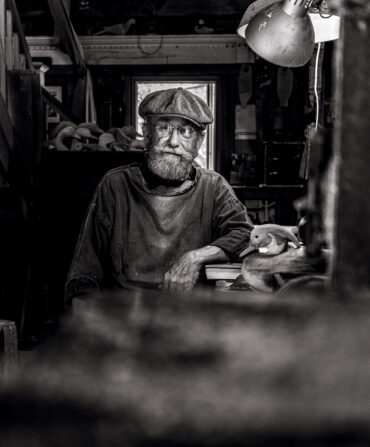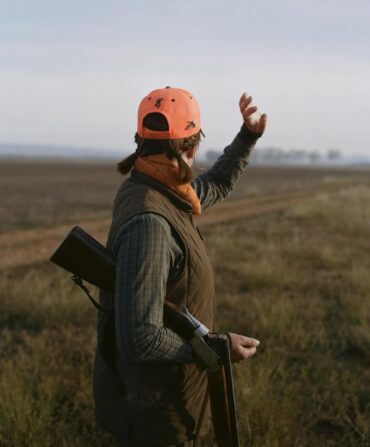Sporting
Mike Hester’s Dogged Pursuit
With sheer determination, Mike Hester has spent decades turning his family’s farm into a hotbed of wild quail and champion bird dogs. And it all traces back to a love of the hunt
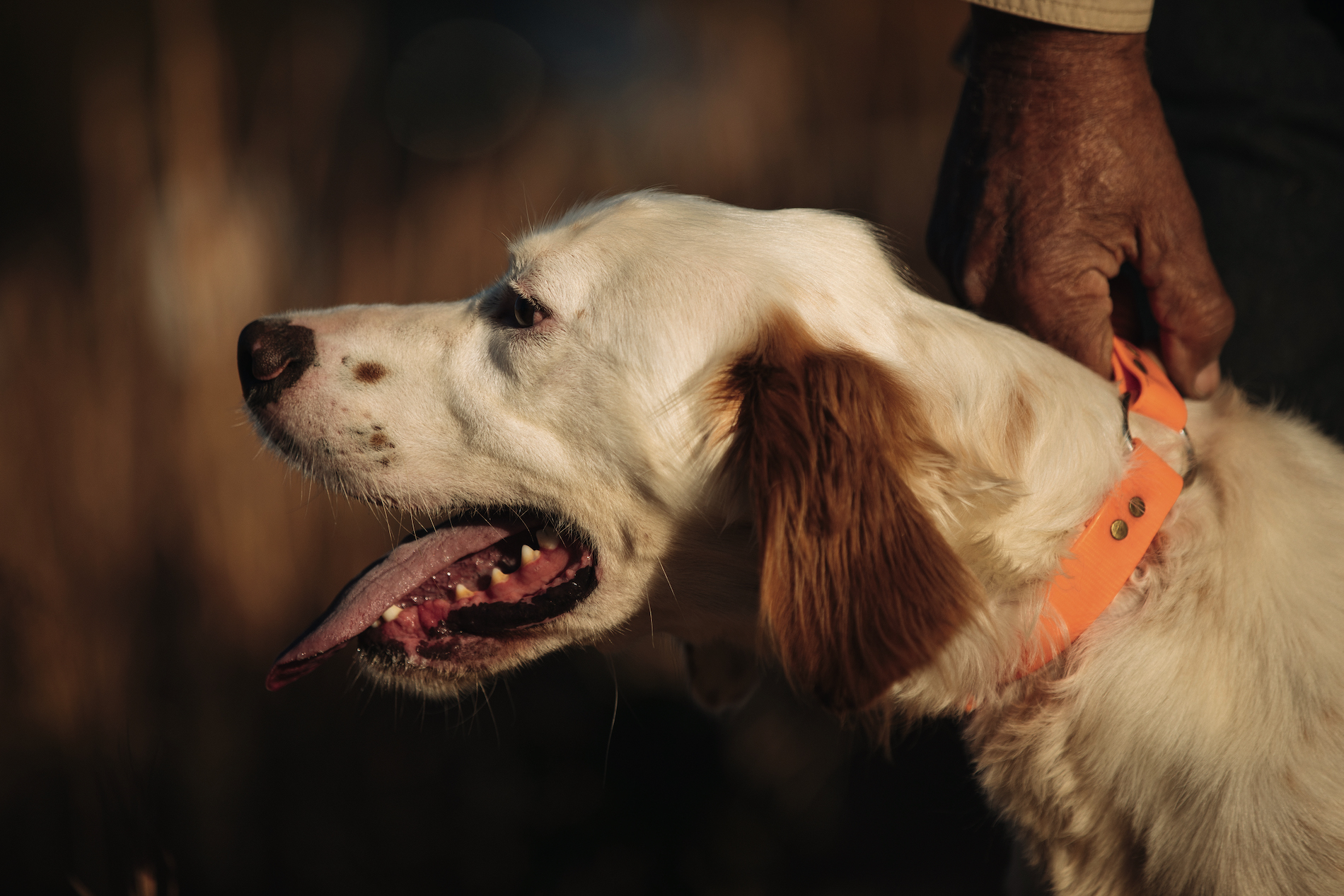
Photo: Forest Woodward
Bozann’e Rex, a white-and-orange English setter, during an evening training session.
The wind has come when I arrive at Mike Hester’s Foxwood Plantation and County Line Kennel in Mebane, North Carolina. With it came the bite of late fall’s damp and the promise of a night’s first freeze. Tree limbs rattle, still shimmering with leaves announcing the glories of fall in auburn, red, and yellow. Standing with Hester, discussing the coming frost at the edge of a garden bursting with okra and eggplants, I am struck by how removed much of my life is from the rhythms of the earth, and how very connected Hester’s is to the same.
There are things in this world so elemental as to be invisible to the main of us, things not recognized on short timelines. They require permanence, intention, a forethought anathema to most of us in our disposable, drive-through world. They are found rooted in soil, deep in the woods that remain, or following their noses through lespedeza and sorghum to lock up at point, tails vibrating with purpose. Such things are the province of Mike Hester. It’s been this way since he was twelve years old.
Mike Hester is a dog man. Raising and training quail dogs with his County Line Kennel is far from all he does, but it is his central passion. From it spring his hunting preserve, his land management and consulting business, and his horse training, all supporting efforts for the moment one dog goes statuesque and a second moves in to honor the point.
As we stand at the edge of a field falling away to a bottom, land upon which three generations of Hesters have lived and farmed, he recalls dogs long gone and the patter of shotgun pellets falling into the grass on which we stand. Foxwood is awash in memories. It’s the Hester family center. His daughter, Toshia Caceres-Padilla, soon arrives to cut a season’s worth of okra, and together, they recount the family’s history here.
Hester’s grandfather and grandmother bought the initial one hundred acres when they returned to Alamance County from Person County, fifty miles away, to be closer to her people. An African American couple with a hundred acres was a rarity in early twentieth-century Mebane. Perhaps rarer still, the land escaped sale in the early and mid-twentieth-century migration to the urban North, passing to Hester’s father and two uncles in the early 1970s.
His mother and father did what was necessary to survive and feed their three girls and six boys. In addition to farming corn, tobacco, wheat, sorghum, and lespedeza hay, his father worked as a mechanic in the winter. He cut wood in the fall. Summers brought the exhaustive, leaf-by-leaf process of cutting, grading, tying, and stacking tobacco. Contrary to what Hester calls the “clean farming” practiced today, such labor-intensive small rural farms made for perfect quail habitat. Growing up, he soon became one of the hunters in the field below the house, often alongside his uncle Johnny, a man who “always found quail.”
“We’d shoot on the covey rise, and birds would go everywhere,” Hester recalls. “He smoked Pall Malls, so he’d sit down on a stump and light one while the dogs were pointing the individual birds and say, ‘We’re not gonna shoot singles. Let’s just wait fifteen or twenty minutes, let the birds gather in the woods and give off more scent.’” That lesson in patience has stuck. Today, Hester trains all of his dogs to be steady to wing and shot and to persist beyond that initial covey rise, to ignore distractions and go deep in the woods where the birds seek to aggregate, one of many lessons that have contributed to his skill in training champion bird dogs.
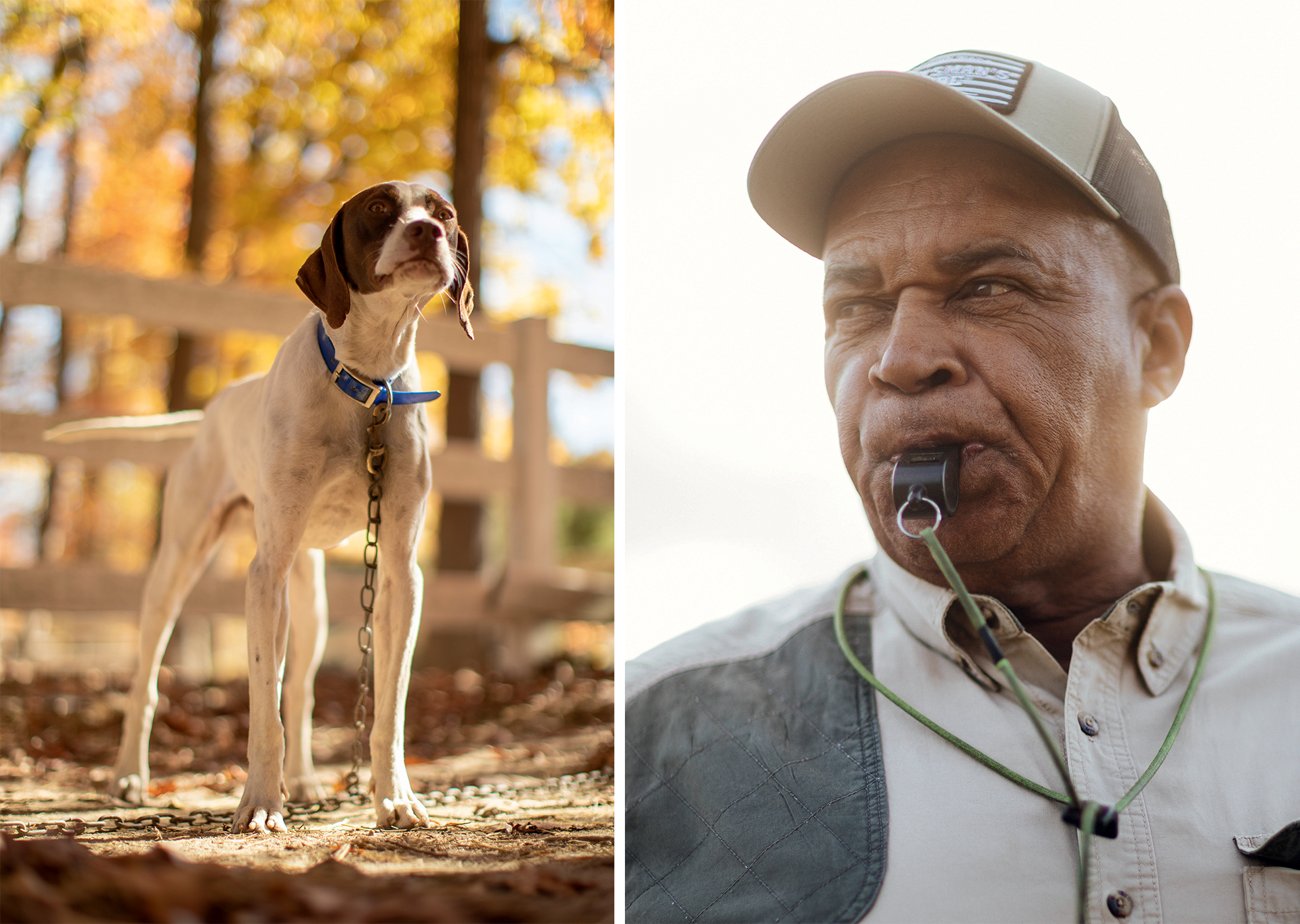
Photo: Forest Woodward
Man, a young English pointer, between training sessions at Foxwood; Mike Hester in the field.
Hester’s County Line Kennel dogs have placed in, or won, more than sixty championship field trials. Now he’s on track to head to the National Championship for Bird Dogs, held each February near Grand Junction, Tennessee, having qualified by winning the North Carolina Open All-Age Trials and the Kentucky Open All-Age Championship trophies with a muscular English pointer named Quickmarksman’s Dan.
From his early tutelage with Uncle Johnny, Hester graduated to getting his own quail dogs when he was sixteen. “I never really got a good one until a friend sold me a puppy out of a line that had produced a good dog once,” he says, “and finally I had Major.” As is often the truth of the best dogs in our lives, Major taught him as much as he taught Major.
“On [his first] opening day, I’d never shot over Major, and at the first shotgun blast, he went to the truck!” Hester recalls. “He could point and hold, but the minute a gun went off, he was headed to the house.” Hester thought he’d struck out until a hunt in which he shot three birds on a covey rise, again sending Major toward the truck. “But on the way, he saw a cripple. He chased and caught it and was never again gun-shy.” Thereafter, Hester says, Major’s “bird sense” overwhelmed any fear he had. From then on, “if I didn’t find him, he would come get me, lead me back to the covey, and point again!” That hunger to find game birds is one of the things he looks for and seeks to develop in his dogs. He smiles at the memory, and then, with a slight nod and wrinkled eyes, says, “It’s true.” It’s a conversational characteristic he uses to emphasize a particular point in the distinctive accent of the North Carolina Piedmont, one that shares vestiges of early settlers and thickens as you go northward toward Virginia.
Quickmarksman’s Dan is a striking white-and-liver English pointer, sleek of coat and chiseled of head. His back legs bulge with muscle. Dan quivers as he waits for Hester to prepare his partner Tom, an English setter. Once released, both dogs are soon out of sight, racing through briars, dodging pine and hardwood, and crashing through fields of sorghum and lespedeza Hester planted specifically for quail. “Dan is stylish,” he says when I ask what sets him apart. “Dogs talk with their tail, and when he’s running, he has a lot of tail action that tells a judge he’s hunting for game. When he points, his tail is up at twelve o’clock, and his head is almost as high as his tail.”
Since we are out today for training, we follow Dan and Tom in an off-road vehicle rather than upon the Tennessee walking horses Hester keeps and trains for field trial competitions. Horses are now an important income stream at Foxwood, but as Hester recalls with a laugh, he didn’t even know how to saddle a horse when he began competing. He had to borrow a friend’s trailer to get to his first competitions. But he learned horsemanship as he does most everything else, with a blend of patience, trial and error, and hands-on repetition he calls, simply, “the old way.”
After buying and leasing acreage from his aunts to add to his initial portion of the farm, Hester now has about 125 acres, with access to hundreds more he manages specifically for hunting. His twenty-five annual hunting membership holders are blessed with expertly planned habitat for deer, turkey, rabbit, duck, and more. But the focus remains quail, and accordingly, over decades he’s established switchgrass and big and little bluestem, Indian, and love grasses to provide cover. Even as we talk deer, Hester makes a point of showing me the bicolor lespedeza, beloved by quail, he hand planted along the edge of a wood line thirty years ago, one of many types of forage he’s added to Foxwood.
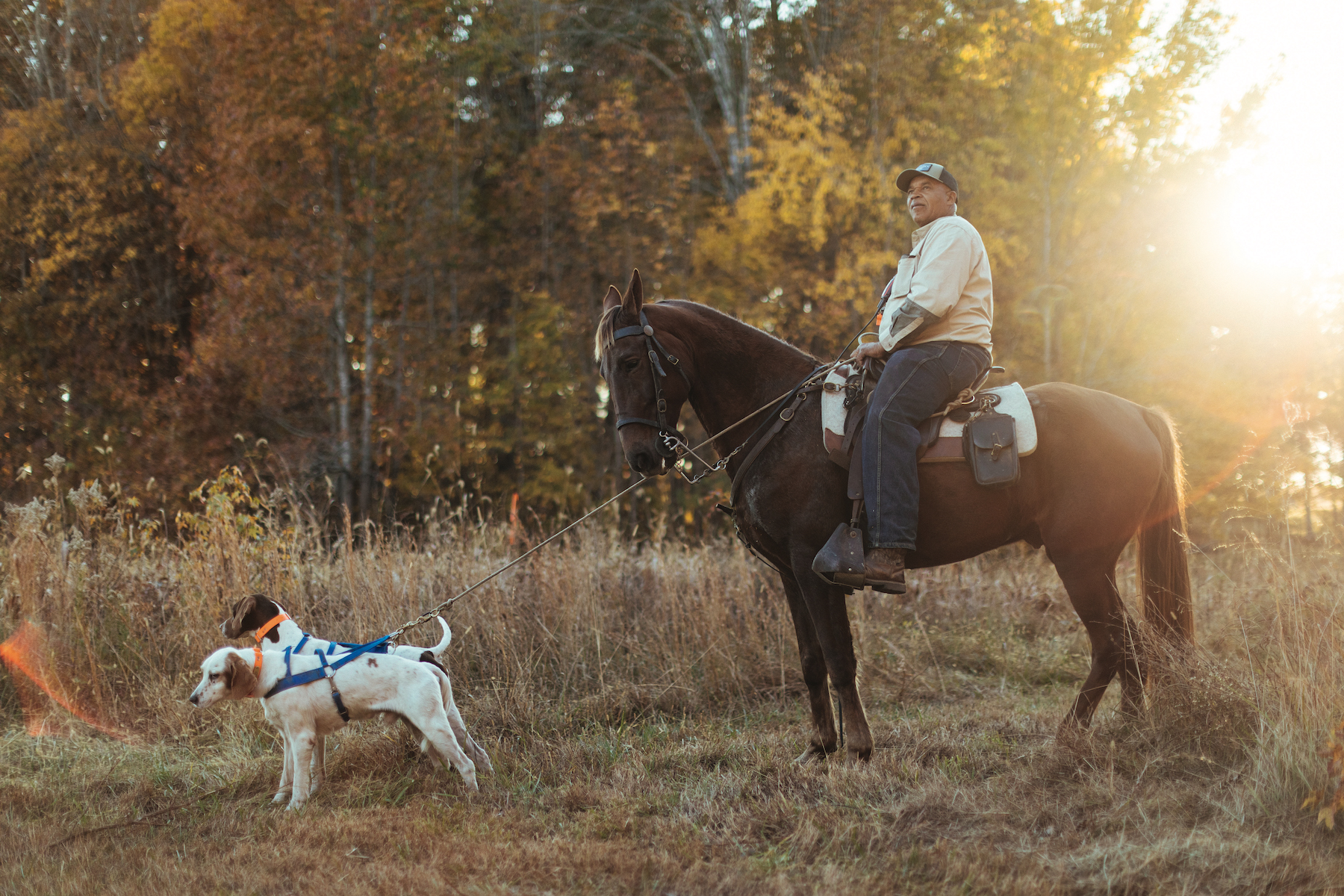
Photo: Forest Woodward
Tom, an English setter, and Dan, an English pointer, get ready to head out for training, with Hester on horseback.
When a family spends a century on the land, memories grow in these same fields. “Right there is where Major caught that cripple!” he announces, pointing toward a corner of a field. As we walk through a bottom, he points into a stand of hardwood. “There is where I hunted with my uncles.” As we parallel a tree line: “That is an objective where dogs learn how to push deep into the woods to find reconstituted coveys.” There is a purpose for everything at Foxwood, a purpose Hester knows because he put the item there, planted it, built it, or lived the history behind it. That work ethic and attention to detail have paid off.
“He’s just done a tremendous job of creating something that no longer exists elsewhere—wild quail,” says Darell Bigner, a neighbor and lifelong hunter who remembers when knocking on farmhouse doors to ask for permission to hunt quail was the standard. Hester does supplement the population with released birds for his hunters, but the interaction between his perfectly disciplined dogs and those perfectly wild quail produces an experience that reaches back into history—and memory. “Being in the field with good clean air, the dogs statuesque and honoring one another,” Hester says. “Being with two or three real good friends. Follow it all up with a sociable drink? There isn’t a better event.” I’m inclined to agree.
Hester turned sixty-six in October. In the manner of two men of middle age, we talk about the way things used to be and the way they are now. He was born in a time when African Americans trained dogs but largely could not show them. Today, he is still often the only African American running dogs at a field trial. We talk about patience and how critical it is in raising dogs. “A first-year dog is two to three years old,” he says. “For the first year of their lives, just let them be pups and learn from it. Let them learn to hunt. When they are ready to train, it takes a year to make a dog, and then they’re game. Most people want to go too fast. The best way is the old way: Go slow. Be consistent. Don’t hunt for the dog, let the dog hunt. Let them learn in the right environment, and they’ll get bird sense.”
With his century of family history on this land, I ask Hester what legacy he wants to leave. He looks down, taking a moment to consider the question. When he looks back at me, his eyes hold the same resolve and purpose that characterize everything he does. “I want people to say I was a good dog and horse trainer. I want to be remembered for my integrity and knowledge of the dogs and the horses and wildlife management.” I press him, asking of which he is proudest. “There’s no question, the dogs. Because as a minority, I’ve probably accomplished more with competitive dogs than any Black person ever. It matters, because in the world we live in, it is proof any young person who works hard enough can be anything. Older guys told me I’d never make a living, that I would starve to death. But my father gave me a work ethic, so I just worked harder.”
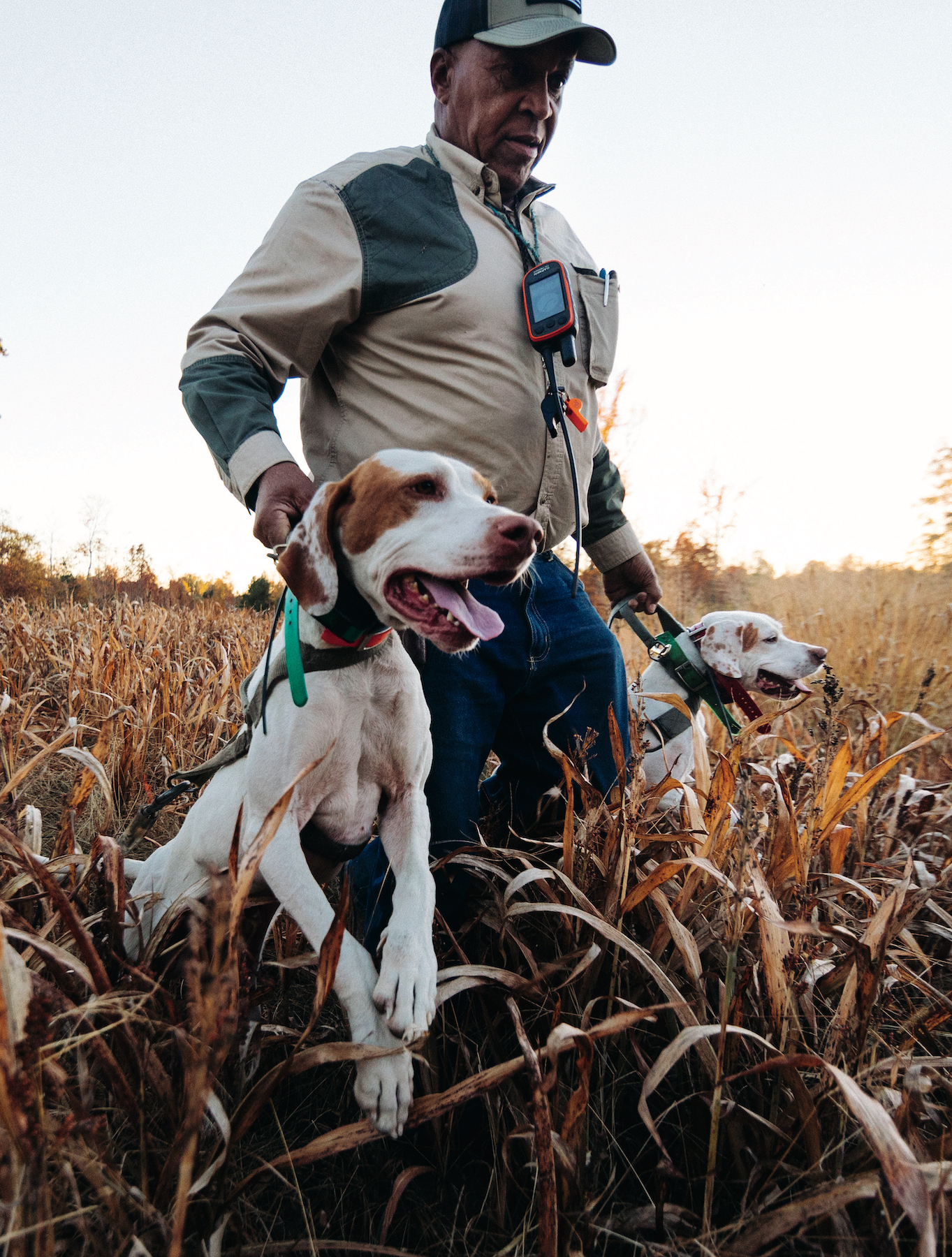
Photo: Forest Woodward
Hester works with Heisman (left), a pointer belonging to his grandson, and Trudy, a client’s dog, in a quail field.
Working dogs takes a strong set of lungs, and Hester warns me that he’s about to commence singing. “My dogs know my song,” he tells me before erupting in a basso that carries over engine noise and across the almost quarter mile between us and the dogs. “Heeey! Heeeeyeeeyo! Here, Dan! Here, Dan! Here, Tom!” And then there they are, plunging through vegetation taller than they to check in with us before bounding off again. There’s a relinquishment of control required in the thick woods and agricultural fields of Foxwood. You simply can’t see the dogs, and Hester relies on a GPS receiver that soon tells him they have locked up on a covey.
When we arrive, the dogs are a picture. Still, but vibrating with anticipation. Tails pointing straight up into a sky threatening rain. Hester dismounts the ATV and begins moving through waist-high sorghum. Wild quail explode into the air. Years of shotguns have rendered his hearing less than it was, but I hear covey birds still chirping on the ground, and Dan and Tom persist on the point. Then groups of three and four quail leap up to whir deep into the nearby woods to seek one another there, just as Uncle Johnny taught Hester they would when he was twelve. As I look at him, his face reflects my own pure joy. “I tried to move them off those birds, but they knew they were there!” As we follow Dan and Tom to five more wild coveys over two hours, I see that look five more times.
Later, over a late lunch at Martinho’s Bakery & Deli in Mebane, where the staff call him Mr. Hester and know his usual order, we both look back at the years behind us. Recently retired, I mention how much I am enjoying the opportunity to slow down. Hester laughs and says, “You know, at my age, peace and quiet get to mean something. But I’ll never retire. I will eventually cut back, but I never want to retire. Because I thoroughly enjoy watching a young dog become a champion.”
It’s true.


